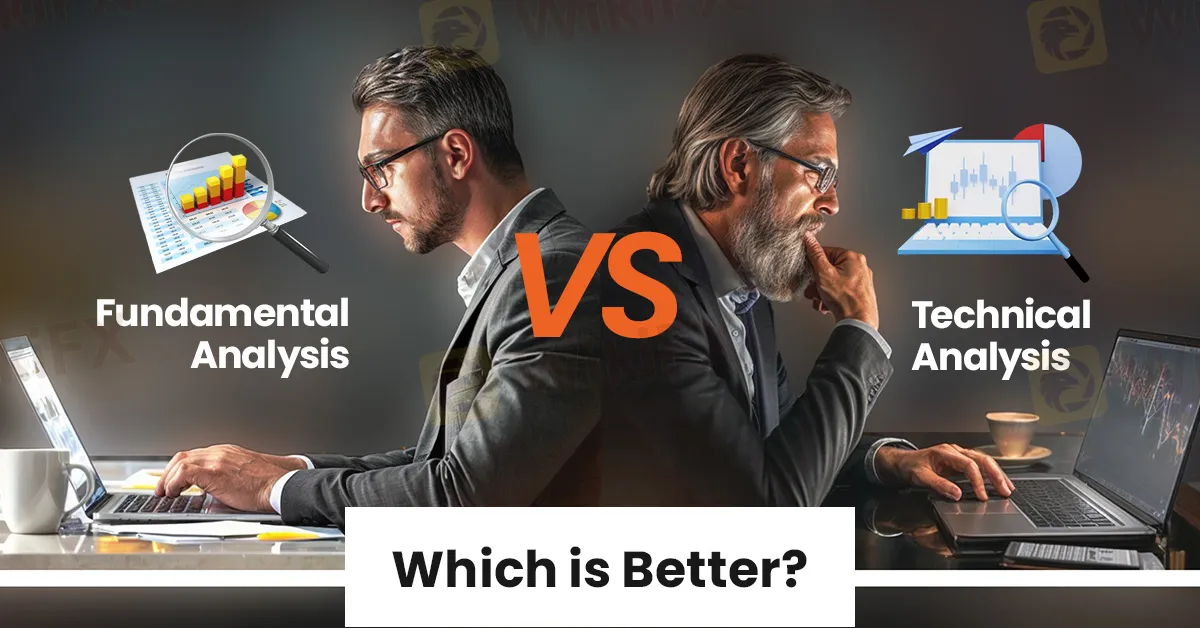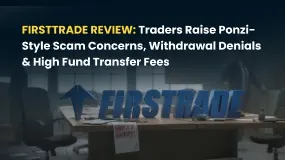简体中文
繁體中文
English
Pусский
日本語
ภาษาไทย
Tiếng Việt
Bahasa Indonesia
Español
हिन्दी
Filippiiniläinen
Français
Deutsch
Português
Türkçe
한국어
العربية
Fundamental VS Technical Analysis - Which is Better?
Abstract:Discover the ultimate trading secret: the battle between fundamental and technical analysis unveiled.

In the world of forex and cryptocurrency trading, there exists an ongoing debate between two major schools of thought: fundamental analysis and technical analysis. Both methodologies offer unique perspectives on market behaviour and can be powerful tools in the hands of skilled traders. However, the question remains: which approach is better?
Fundamental analysis revolves around the examination of economic, social, and political factors that may influence the value of a currency or cryptocurrency. This includes assessing factors such as interest rates, inflation, geopolitical events, and economic indicators like GDP growth and employment figures. Proponents of fundamental analysis argue that these fundamental factors ultimately drive long-term trends in the market.
On the other hand, technical analysis focuses on the study of historical price and volume data to identify patterns and trends. Technical analysts use tools such as charts, trendlines, and indicators like moving averages and relative strength index (RSI) to make trading decisions. They believe that past price movements can provide insights into future price action and market sentiment.
So, which approach is better?

The truth is, there is no one-size-fits-all answer. Both fundamental and technical analysis have their strengths and weaknesses, and successful traders often use a combination of both methodologies to inform their decisions.
Fundamental analysis is particularly useful for long-term investors who are interested in understanding the underlying value of an asset. For example, in the forex market, central bank policies and economic data releases can have a significant impact on currency valuations over time. Similarly, in the cryptocurrency market, developments such as regulatory changes or technological advancements can drive long-term price trends.
However, fundamental analysis may not always be timely in a fast-moving market. Economic data releases can be unpredictable, and their impact on the market may be delayed or muted by other factors. Moreover, fundamental analysis can sometimes be subjective, as different analysts may interpret the same data differently.
On the other hand, technical analysis excels in identifying short-term trading opportunities and timing market entries and exits. Technical indicators can help traders spot trends, reversals, and support and resistance levels, allowing them to make informed decisions based on price action. Technical analysis also tends to be more objective, as price data is readily available and can be analysed using standardized tools and techniques.
However, critics argue that technical analysis alone may not provide a complete picture of market dynamics. Price movements are influenced by a wide range of factors, and technical indicators can sometimes generate false signals or fail in volatile market conditions.
Ultimately, the effectiveness of fundamental versus technical analysis depends on the individual trader's preferences, time horizon, and risk tolerance. Some traders may prefer to focus exclusively on one approach, while others may use a combination of both. Whichever path you choose, it's essential to continuously educate yourself, adapt to changing market conditions, and practice proper risk management techniques. After all, successful trading is not about finding the “better” approach but rather about finding what works best for you.

Disclaimer:
The views in this article only represent the author's personal views, and do not constitute investment advice on this platform. This platform does not guarantee the accuracy, completeness and timeliness of the information in the article, and will not be liable for any loss caused by the use of or reliance on the information in the article.
Read more

Firsttrade Review: Traders Raise Ponzi-Style Scam Concerns, Withdrawal Denials & More Issues
Have you lost all your capital while trading via Firsttrade? Does the US-based forex broker disallow you from withdrawing funds? Do you have to pay massive fees when transferring funds? Does your trade get affected because of frequent malfunction in the trading app? These have been haunting many traders at Firsttrade. Consequently, many of them have raised complaints online. In this Firsttrade review, we have shared such complaints. Keep reading to know about them.

Defcofx Review: Spread Manipulation & Poor Customer Support Outrage Traders
Does the poor customer support service leave you stunned when trading via Defcofx? Do you receive blunt, negative responses from the support team on several trading queries? Does the Saint Lucia-based forex broker pile on the losses for you by manipulating forex spread charges? In this Defcofx review, we have shared some complaints made against the broker. This will further answer your question: Is Defcofx real or fake?

Beware the “Ghost Brokers” This Halloween — Trade Safely with WikiFX
Stay safe this Halloween! Spot and avoid ghost brokers in the forex world with WikiFX – your trusted tool for verifying broker legitimacy.

FP Markets Social Trading Expands Global Access
FP Markets Social Trading connects traders worldwide, offering copy trading, Forex strategies, and expert insights across global markets.
WikiFX Broker
Latest News
How to Add and Take Out Money from Amillex Broker: A Complete Guide
FCA warning: These Firms are on the list
Ponzi Scheme Operator Sentenced to 14 Years in Western Australia
Dubai VARA Warns Against Vesta Investments
Don’t Get Scammed: A Roundup of Common Online Fraud Tactics in Forex
T4Trade broker Review 2025: Is T4Trade Regulated?
Chicago PMI Beats But Remains In 'Contraction' For Second Straught Year
MH Markets Overview: Fees, Platforms, and Regulation
Is MultiBank Group Legit or Scam? A 2025 Regulation Review
Firsttrade Review: Traders Raise Ponzi-Style Scam Concerns, Withdrawal Denials & More Issues
Currency Calculator



